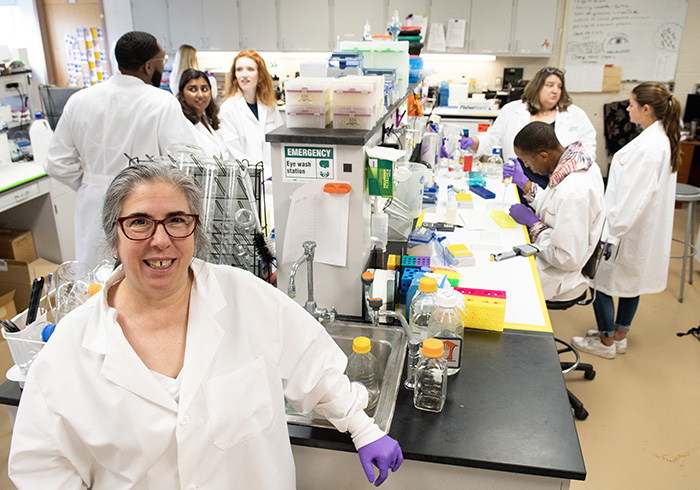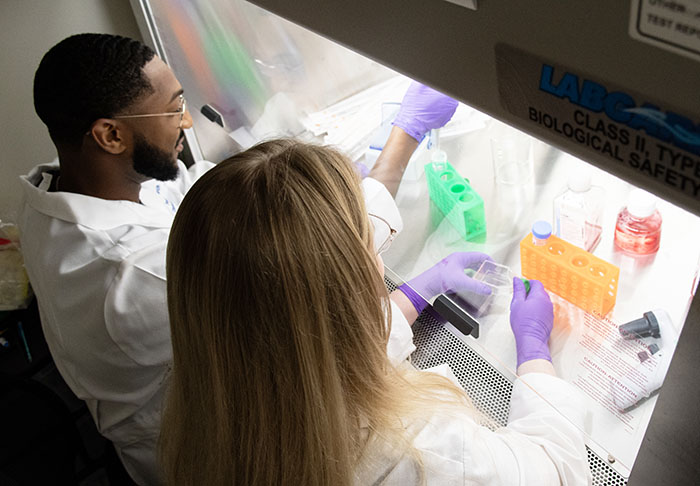A Novel Approach to the Treatment of Osteoarthritis–in Dogs and Humans
February 21, 2024Osteoarthritis is characterized by the gradual deterioration of cartilage in the joints
of the body. The disease affects over 80 percent of the global population aged 60
and older. Cartilage serves as a cushion and shock absorber between bones and facilitates
the movement of joints. Breakdown of cartilage leads to pain and impaired mobility.
Once gone, cartilage is not replaced.
What is osteoarthritis?
Cartilage is strengthened by a dynamic lattice-type framework of collagen, proteins,
carbohydrates and fluid known as an extracellular matrix. Marina D'Angelo, PhD, professor, course director for several blocks of the PCOM One DO curriculum, and founder and chief science officer of ProteaPex Therapeutics, LLC, describes
cartilage's extracellular matrix as a “scaffolding on which the cells live.”
Dr. D'Angelo, whose research focuses on developing treatments to prevent diseases of bone and joints, explained that when cartilage breaks down over time, the cushioning properties of
the extracellular matrix is lost and the cartilage cells gradually are replaced by
bone cells leading to the disabling symptoms of osteoarthritis. Joints like the knee,
hip and shoulder are commonly affected.
Currently, there are no effective treatments for the reversal of osteoarthritis. Dr.
D'Angelo says that some interventions, such as steroid injections or other non-steroidal
anti-inflammatory drugs, manage symptoms temporarily but don't address the underlying
issue of cartilage destruction. Eventually, patients may require joint replacement
surgery to restore mobility and quality of life.
A "disease-modifying" approach to the treatment of osteoarthritis
Dr. D'Angelo and her collaborators (Drs. Hafez Selim, Kathryn Behling and Fusun Ozer)
have taken a novel approach to preventing the destruction of the extracellular matrix
in cartilage and other tissues. Their technology is "a way to interfere with the enzymes
that break down the cartilage itself–the hallmark of osteoarthritis," says Dr. D'Angelo.
The drugs they invented, called extracellular matrix protection factors (ECPFs), are
designed to block the ability of degrading enzymes of the matrix metalloproteinase
family, to bind and cleave molecules of the extracellular matrix. Extensive testing
in cultures of human osteoarthritic cartilage cells obtained from patients undergoing
knee replacement surgery and in rodents demonstrated reduction of extracellular matrix
degradation and improved mobility.
"What we're using now has the potential to be disease-modifying," says Dr. D'Angelo.
These novel, patent-protected drugs are a platform of therapeutics of the PCOM spin-out
company ProteaPex Therapeutics, LLC.
Expansion of technology application
The extracellular matrix is also degraded in periodontal disease in which infection
leads to softening of the tissue around the teeth. Utilizing gingival fibroblasts
isolated from patients with extensive periodontal disease, Dr. D'Angelo's group has
demonstrated that ECPF slows the degradation of gum tissue associated with periodontal
disease.
Degradation of the extracellular matrix may be accompanied by changes in its composition
in the lung resulting in loss of elasticity and reduced gas exchange. Dr. D'Angelo's
lab and ProteaPex have been investigating the effects of ECPFs in cultures of lung
cells obtained from patients with chronic obstructive pulmonary disease (COPD), with
the eventual goal of testing the drugs in animals.
Dogs, like humans, can develop osteoarthritis. The process of disease progression
is similar in the two species. Treatment options for dogs include pharmacological
symptom management or potential knee replacement. These options can temporarily manage
pain, but they may pose serious medical risks to canine companions.
Dr. D’Angelo says, “Our plan to drive the technology forward is to target the companion
animal market because of the consistency between what's happening in both dogs and
humans. Also, the path to FDA approval for use of our drugs in humans requires testing
in animal models of osteoarthritis before beginning clinical trials.”
The osteopathic difference
Osteoarthritis lacks a definitive treatment to reverse disease progression. Currently,
drugs are prescribed to reduce pain and inflammation. Osteopathic manipulative therapy aimed at strengthening associated muscles, ligaments, and supporting sheaths of dense
extracellular matrix, and promoting blood flow to the joint, may reduce the need for
palliative drugs and improve quality of life.
View more PCOM research news and learn more about research at PCOM.
About Philadelphia College of Osteopathic Medicine
Established in 1899, Philadelphia College of Osteopathic Medicine (PCOM) has trained
thousands of highly competent, caring physicians, health practitioners and behavioral
scientists who practice a “whole person” approach to care—treating people, not just
symptoms. PCOM, a private, not-for-profit accredited institution of higher education,
operates three campuses (PCOM, PCOM Georgia and PCOM South Georgia) and offers doctoral degrees in clinical psychology, educational psychology, osteopathic
medicine, pharmacy, physical therapy, and school psychology. The college also offers
graduate degrees in applied behavior analysis, applied positive psychology, biomedical
sciences, forensic medicine, medical laboratory science, mental health counseling,
physician assistant studies, and school psychology. PCOM students learn the importance
of health promotion, research, education and service to the community. Through its
community-based Healthcare Centers, PCOM provides care to medically underserved populations.
For more information, visit pcom.edu or call 215-871-6100.
Contact Us
For general media inquiries, please contact the Office of Marketing and Communications
at 215-871-6300 or communications@pcom.edu. Visit our media relations page to view contact information for public relations personnel.
Connect with PCOM

 Cartilage is strengthened by a dynamic lattice-type framework of collagen, proteins,
carbohydrates and fluid known as an extracellular matrix.
Cartilage is strengthened by a dynamic lattice-type framework of collagen, proteins,
carbohydrates and fluid known as an extracellular matrix.  Dogs, like humans, can develop osteoarthritis. The process of disease progression
is similar in the two species. Treatment options for dogs include pharmacological
symptom management or potential knee replacement. These options can temporarily manage
pain, but they may pose serious medical risks to canine companions.
Dogs, like humans, can develop osteoarthritis. The process of disease progression
is similar in the two species. Treatment options for dogs include pharmacological
symptom management or potential knee replacement. These options can temporarily manage
pain, but they may pose serious medical risks to canine companions.